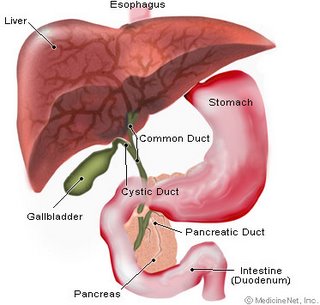Pancreas
The pancreas is a long, flat gland tucked behind your stomach between the upper part of your small intestine (duodenum) and your spleen. It plays important roles in digestion and metabolism. The organ produces enzymes essential for digestion and secretes hormones that help control blood sugar levels.
Food Needs to be Digested:
Food consists of carbohydrates (e.g. starch), proteins (e.g. meat), and fat (e.g. butter), and digestion is not possible without the enzymes produced by the pancreas. The digestive portion that produces digestive enzymes is called the "exocrine pancreas". The hormone-producing portion is called the "endocrine pancreas".
The Exocrine Pancreas:
The pancreas makes a number of different enzymes each of which is responsible for breaking down the different types of food into small particles suitable for absorption. The enzymes are made in small glands within the pancreas and travel along increasingly large tubes until finally they reach the main pancreatic tube. This connects the gland to the first part of the bowel where food passes after it has gone through the stomach.
The enzymes are not active when they are first made within the pancreas (otherwise they would digest the pancreas as well) but when they pass into the bowel they are activated by the juices in the bowel. The main enzymes are called amylase (which digests carbohydrates), trypsin (which digests protein) and lipase (which digests fats). The bile, which comes from the liver, is also very important for the digestion of fat because it acts like a soap and breaks up the fat into minute droplets so that the pancreatic lipase can digest it.
The Endocrine Pancreas:
The hormone-producing portion of the pancreas is called the "endocrine pancreas". The hormones secreted by the endocrine pancreas are insulin, glucagon, and somatostatin. The cells that secrete insulin are called Islet of Langerhans cells, or more simply just "islet cells".
Their effects are:
Food Needs to be Digested:
Food consists of carbohydrates (e.g. starch), proteins (e.g. meat), and fat (e.g. butter), and digestion is not possible without the enzymes produced by the pancreas. The digestive portion that produces digestive enzymes is called the "exocrine pancreas". The hormone-producing portion is called the "endocrine pancreas".
The Exocrine Pancreas:
The pancreas makes a number of different enzymes each of which is responsible for breaking down the different types of food into small particles suitable for absorption. The enzymes are made in small glands within the pancreas and travel along increasingly large tubes until finally they reach the main pancreatic tube. This connects the gland to the first part of the bowel where food passes after it has gone through the stomach.
The enzymes are not active when they are first made within the pancreas (otherwise they would digest the pancreas as well) but when they pass into the bowel they are activated by the juices in the bowel. The main enzymes are called amylase (which digests carbohydrates), trypsin (which digests protein) and lipase (which digests fats). The bile, which comes from the liver, is also very important for the digestion of fat because it acts like a soap and breaks up the fat into minute droplets so that the pancreatic lipase can digest it.
The Endocrine Pancreas:
The hormone-producing portion of the pancreas is called the "endocrine pancreas". The hormones secreted by the endocrine pancreas are insulin, glucagon, and somatostatin. The cells that secrete insulin are called Islet of Langerhans cells, or more simply just "islet cells".
Their effects are:
- insulin--lowers blood sugar;
- glucagon--raises blood sugar;
- somatostatin--inhibits release of a variety of hormones, including growth hormone, thyrotropin, corticotropin, insulin, glucagon, gastrin, secretin and renin.
These functions, both exocrine and endocrine, may be affected by pancreatitis, an inflammatory condition that occurs when digestive enzymes, instead of breaking down food in the small intestine, attack the pancreas itself.
..

Link to Pancreas: Wikopedia>Pancreas
Double click on the arrow inside the screen for Weird Al's fun "Pancreas" video/song!
To view information on another disease, click on Pancreatitis SOD Library.!
..
